سواء كنت تدوّن قائمة البقالة أو ملاحظات الفصل الدراسي أو محاضر الاجتماعات، فإن برنامج تدوين الملاحظات الرقمي مفيد في كل مرة.
لحسن الحظ، هناك الكثير من تطبيقات تدوين الملاحظات في السوق، مما يضمن لك العثور على التطبيق الذي يلبي - أو حتى يتجاوز - توقعاتك الجامحة.
لا تقدم جميع برامج تدوين الملاحظات نفس العمق أو مجموعة متنوعة من الأدوات لتحسين تجربتك، وفي الحقيقة قد لا تحتاج حتى إلى كل ميزة في قائمتهم!
حتى مع وجود الكثير من خيارات تدوين الملاحظات في متناول يدك، يهيمن عدد قليل من المنافسين الأقوياء على السوق، وسنستعرض اثنين منهم لمساعدتك في تحديد ما إذا كانا يستحقان استثمارك.
استعد للمواجهة النهائية لتدوين الملاحظات بين Obsidian و Notion. تحليل لكل ما يقدمه كل منهما من حيث الميزات والأسعار والدعم وغير ذلك.
_بالإضافة إلى ذلك، منافس إضافي على بطاقة البدل التي يمكن أن تذهلك
ما هو برنامج Notion؟

تدوين الملاحظات في الملاحظةمفهوم هو مساحة عمل شاملة لـ الويكي، والملاحظات، وقواعد البيانات . كبرنامج قائم على المستندات يستخدم Notion بشكل أساسي لتدوين الملاحظات ولكن يمكن أن يكون مفيدًا أيضًا في إدارة المهام والمشاريع الأساسية.
بشكل عام، إنه مفيد جدًا.
لقد غطت Notion قواعدك عندما يتعلق الأمر بملاحظات الفصل الدراسي, محاضر اجتماعات العمل والتحرير التعاوني، ومواقع الويكي الخاصة بالشركة، كل ذلك على واجهة بسيطة مع الكثير من القوالب، ومجتمع مخصص مستعد للمساعدة.
فيما يلي تفصيل لميزات تدوين الملاحظات في Notion.
الملاحظات اليومية
يمكنك إنشاء دفتر يوميات في Notion أو سجل يومي لمهامك باستخدام قالب دفتر اليوميات اليومي. ويمكنك إرفاق الصور والروابط ومقاطع الفيديو أو إضافة الرموز التعبيرية للتعبير عن حالتك المزاجية والشعور بالإبداع على مدار اليوم.
إدارة المهام
يمكن لـ Notion أيضًا أن يتضاعف كـ إدارة المهام تطبيق فوق تطبيق تدوين الملاحظات. أضف مربعات اختيار، وأنشئ لوحة للمشروع، وتتبع التقدم المحرز مع تذكيرات بالحالة مثل القيام به، القيام به، القيام به، الانتهاء منه.
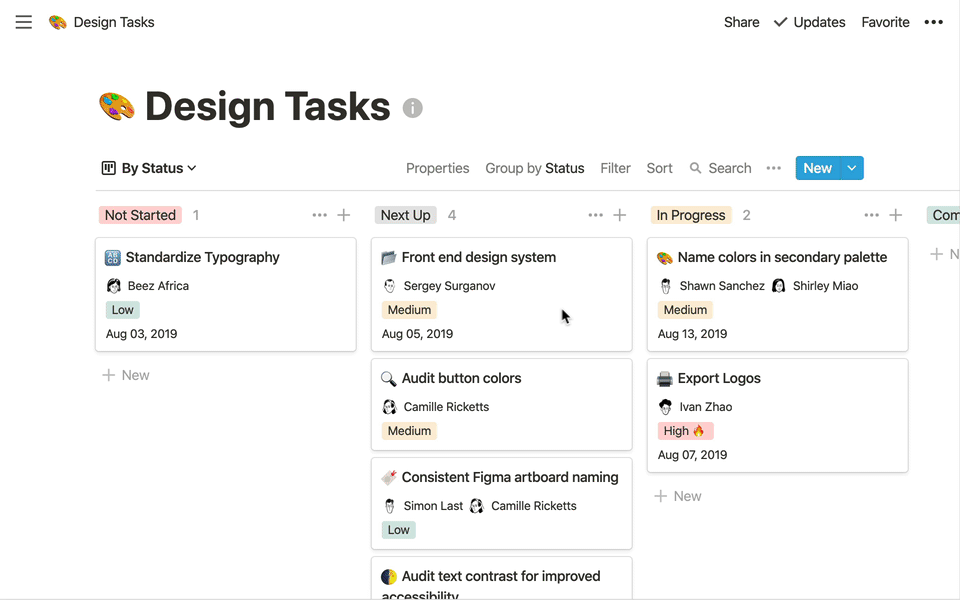
إدارة المهام في Notion
التكامل
يحتوي Notion على مكتبة واسعة من عمليات التكامل لتوسيع وظائفه.
يتكامل التطبيق مع معظم البرامج الشائعة مثل Slack وGoogle Drive وGmail وGmail وAsana وغيرها. إذا كنت ترغب في اتباع نهج عملي أكثر في عمليات التكامل، فإن Notion يتيح لك إنشاء عمليات التكامل الخاصة بك من خلال واجهة برمجة التطبيقات العامة الخاصة بهم.
مواقع Notion الإلكترونية
موقع Notion على الويب هو في الأساس مجلد ملاحظات متاح للجمهور، ولكن بعض الشركات تستخدمه بدلاً من موقع الشركة على الويب. في حين أن هناك قيودًا على ذلك بما في ذلك التخزين والسرعة، يمكن أن تكون مواقع Notion الإلكترونية بديلاً رائعًا لموقعك الشخصي أو سيرتك الذاتية.
Notion AI مفهوم الذكاء الاصطناعي يستخدم معالجة اللغة الطبيعية والتعلم الآلي لتقديم مجموعة من الميزات المبتكرة المصممة خصيصًا لتحسين جودة المحتوى. مع تطبيق Notion AI سيكون لدى المستخدمين مساعد لتحسين بنية الجمل، والعصف الذهني للأفكار، وإعادة صياغة الملاحظات والمزيد.
مميزات Notion
- سهولة الاستخدام بمجرد الإلمام بميزاته وواجهة المستخدم الخاصة به
- تكامل واجهة برمجة التطبيقات مع الأدوات الشائعة
سلبيات Notion
- يمكن أن يتأخر قليلاً بسبب مشكلات وقت الاستجابة
- تهيئته أصعب قليلاً من Obsidian
- لن تمتلك بالكامل الملاحظات التي تدوّنها في Notion نظرًا لأن كل شيء مخزّن على خوادمها
ما هو Obsidian؟
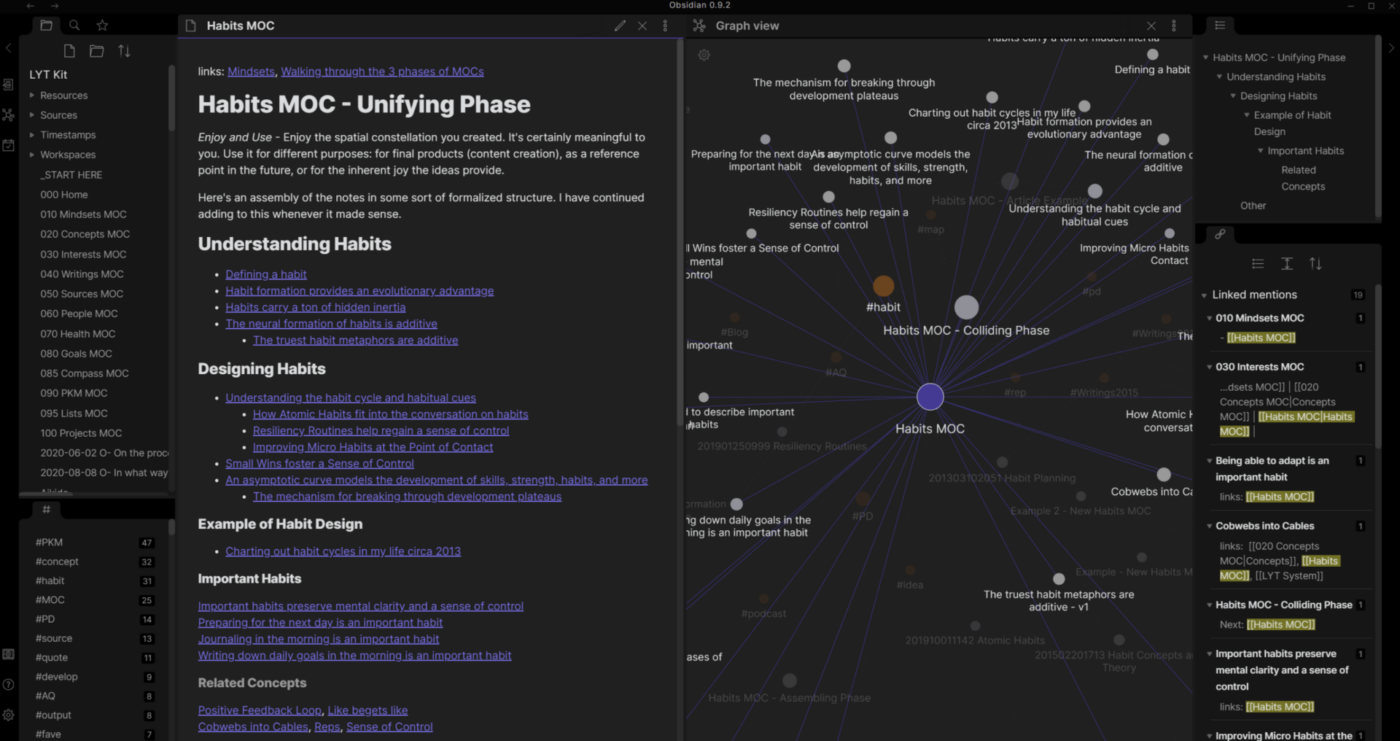
تدوين الملاحظات في سبجObsidian هو تطبيق لتدوين الملاحظات يخزن الملفات محلياً على جهازك بدلاً من تخزينها في السحابة.
باستخدام Obsidian، يمكنك استخدام لغة تخفيض السعر لإنشاء ملاحظاتك. على عكس Notion، الذي يحتوي على بنية قاعدة بيانات، فإن Obsidian لديه بنية رسم بياني معرفي حيث تكون جميع ملاحظاتك مترابطة من خلال الربط ثنائي الاتجاه.
مكافأة:_
_/مرجع/ https://clickup.com/blog/ai-tools-for-note-taking// أدوات تدوين الملاحظات %/%href/_
!
الرسم البياني المعرفي
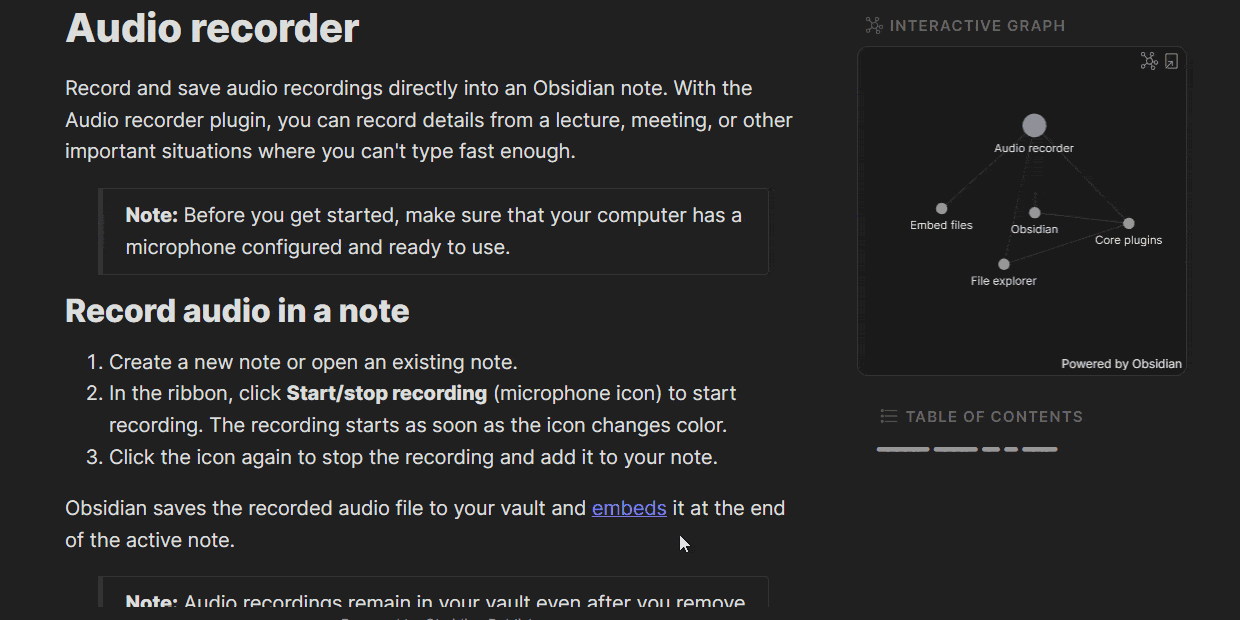
الرسوم البيانية المعرفية في Obsidian
في نظام Obsidian، يتم تنظيم ملاحظاتك وربطها ببعضها البعض من خلال الروابط الخلفية، مما يؤدي إلى إنشاء شبكة أفكار مترابطة بعمق ومرئية للغاية تسمى الرسم البياني المعرفي.
يكون هذا الهيكل مفيدًا عندما يكون اهتمامك الرئيسي هو تدوين الملاحظات التي ترتبط بفكرة مركزية، وهو ما يشبه العقل الثاني.
الإضافات
يمكنك الحصول على إضافات لـ CSS مخصصة، ومعاينات الصفحات، ومسجل الصوت, لوحة كانبان والمزيد. يعتمد Obsidian على المكونات الإضافية أكثر من تكامل واجهة برمجة التطبيقات لتوسيع الوظائف.
نشر أوبسيديان
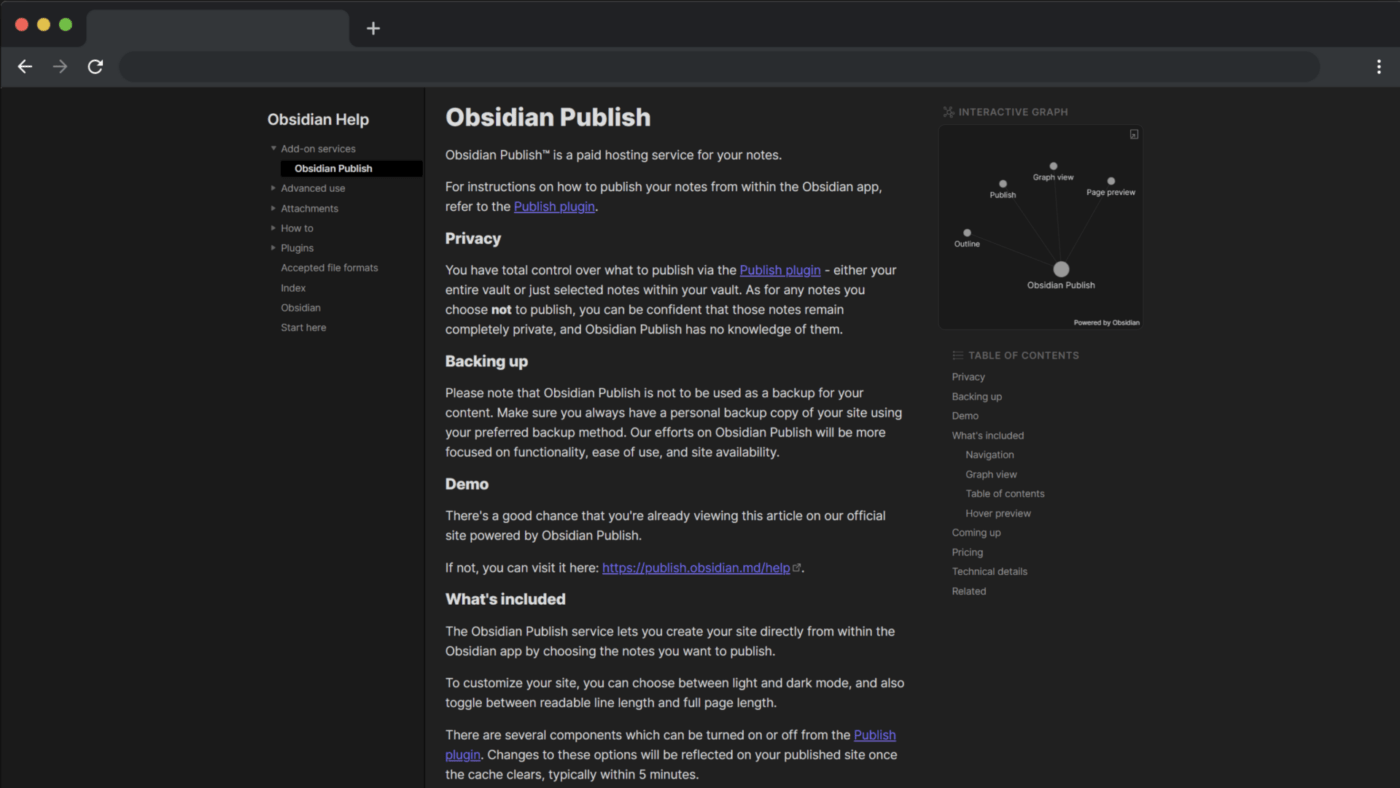
مثال على ما تبدو عليه صفحة Obsidian Publish التي يمكن الوصول إليها بشكل عام
على غرار مواقع Notion Websites، يتيح لك Obsidian Publish نشر Obsidian نشر ملاحظاتك ليطلع عليها الجمهور. يمكنك حتى استخدام المجال المخصص الخاص بك ونشر العديد من خزائن Obsidian كمواقع ويب.
ملاحظة: Obsidian Publish هي ميزة مدفوعة ستكلفك 20 دولارًا شهريًا لكل موقع.
مزايا أوبسيديان
- الكثير من خيارات الإضافات لتوسيع الوظائف
- سهولة التخصيص والتهيئة حسب ذوقك واحتياجاتك
- ترابط رائع لأفكارك، وأفكارك، وملاحظاتك من أجل التدقيق البسيط
سلبيات سبج
- يعد عدم وجود تعاون أصلي أمرًا سلبيًا بالنسبة لمعظم فرق العمل
- قد تكون الأسعار مربكة للغاية
- عليك أن تدفع مبالغ إضافية مقابل ميزات بسيطة ومتوقعة مثل المزامنة عبر الأجهزة
ما هي الاختلافات بين Obsidian و Notion؟
الفرق الرئيسي بين Notion و Obsidian هو أن Notion متاح على الإنترنت، بينما Obsidian متاح فقط دون اتصال بالإنترنت، وسيتعين عليك دفع مبلغ إضافي لمزامنة الملاحظات عبر الأجهزة في Obsidian.
إليك نظرة سريعة ومتعمقة على الاختلافات الرئيسية الأخرى بين Obsidian و Notion:
| نوتيون | أوبسيديان | |||||
|---|---|---|---|---|---|---|
| مساعد الذكاء الاصطناعي | ✅ | |||||
| ميزات التعاون في الوقت الفعلي | ✅ | |||||
| الرسم البياني المعرفي | ❌ | |||||
| ✅ | ||||||
| تطبيق الجوال | ✅ | |||||
| المزامنة عبر الأجهزة | ✅ ✅ | |||||
| وظيفة عدم الاتصال بالإنترنت | ❌ | |||||
| دعم تخفيض السعر | ✅ ✅ | |||||
| التدقيق الإملائي | ✅ | |||||
| دعم واجهة برمجة التطبيقات | ✅ | ✅ | ||||
| التضمين من مواقع الطرف الثالث | ✅ | |||||
| نشر الملاحظات كمواقع ويب | ✅ | |||||
| دعم القوالب | ✅ |
مراجعة الفروق بين برنامج Notion و Obsidian
الآن دعنا نتعمق في التفاصيل الدقيقة لكل ذلك. 😎
1. واجهة المستخدم وتنظيم الملاحظات
لا شك في ذلك. البساطة والقدرة على التخصيص هما أهم جانبين في أي تطبيق لتدوين الملاحظات. إليك ما يمكن توقعه من تطبيق Notion و Obsidian.
نوتيون
في Notion، يمكنك أولاً إنشاء مساحة عمل ثم البدء في إضافة صفحات إلى المساحة. يمكنك إنشاء هيكل مرئي لمستنداتك مع صفحات فرعية وحتى ربط أقسام الصفحة بصفحات أخرى من خلال الروابط الخلفية. يمكنك الوصول إلى الصفحات بسرعة من شريطك الجانبي عن طريق إضافتها إلى المفضلة.
يدعم تطبيق Notion كلاً من تخفيض السعر والتحرير بالسحب والإفلات لتدوين الملاحظات. كما يمنحك أيضًا العديد من الخصائص مثل الرموز التعبيرية واللافتات والعناوين ومربعات الاختيار وغيرها لتحسين ملاحظاتك.
أضف الرموز التعبيرية والصور والمقاطع إلى ملاحظاتك في Notion
أوبسيديان
بدلًا من مساحة العمل مثل Notion، يستخدم Obsidian مصطلح القبو.
القبو هو مجلد يخزن فيه Obsidian ملاحظاتك محليًا على جهازك. اعتمادًا على عدد مشاريعك، يمكن أن يكون لديك مخزن واحد أو عدة مخازن. بعد إنشاء خزانتك الأولى، يمكنك البدء في تدوين ملاحظاتك بنص عادي.
على عكس معظم تطبيقات تدوين الملاحظات، يتيح لك تطبيق Obsidian فتح ملفات متعددة على ما يسميه الأجزاء. يمكنك ضبط الأجزاء أو تقسيمها إلى نسختين من نفس الجزء. على سبيل المثال، يمكنك تقسيم جزء لإظهار عرض التحرير وعرض القراءة للمعاينة.
إلى جانب الملاحظات الخاصة بك، يحتوي Obsidian أيضًا على خيار لعرض جميع ملاحظاتك حول موضوع معين والمواضيع المماثلة التي قمت بربطها.
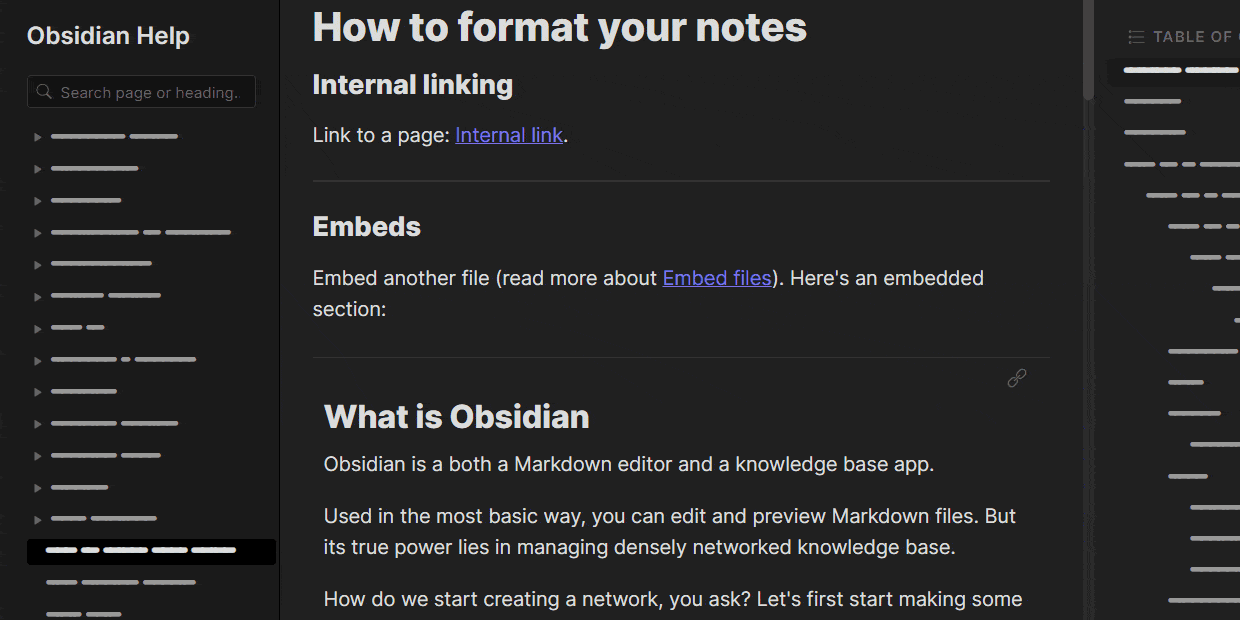
ميزات تنسيق الملاحظات في Obsidian
2. الروابط الخلفية
تطبيق تدوين الملاحظات الذي يتيح لك الربط بين الأفكار والأفكار هو حلم تحقق لمعظم هواة تدوين الملاحظات. دعونا نستكشف كيف يصمد تطبيق Notion و Obsidian على هذا الصعيد.
Notion
تتيح لك ميزة الربط الخلفي في Notion ربط أفكارك عند تدوين الملاحظات. في كل مرة تقوم فيها بإنشاء رابط، تقوم Notion بإنشاء رابط خلفي تلقائيًا.
يمكنك بعد ذلك عرض جميع الروابط الخلفية لصفحة معينة ومعرفة مكان استخدامها بالضبط. هذه ميزة مفيدة عند إنشاء صفحات الويكي الخاصة بك أو ربط الأفكار أو إدارة المهام في Notion.
أوبسيديان
الروابط الخلفية هي إحدى الميزات الأساسية لملاحظات Obsidian وتجعل إنشاء الويكي أبسط بكثير.
فبدلاً من المجلدات الهرمية أو قواعد البيانات، يتيح لك Obsidian إنشاء شبكة مترابطة من الأفكار مع رسم بياني معرفي - وهو مورد مثالي للطلاب والأكاديميين ومهندسي البرمجيات وغيرهم من المهنيين الذين يدونون الأشياء باستمرار.
3. مشاركة الملاحظات وتعاون الفريق
سواء كنت تخطط لنزهة مع الأصدقاء أو تعمل على مشروع ما، فإننا جميعًا نقدر تطبيقًا يتيح مشاركة الملاحظات والتعاون. عندما يتعلق الأمر بـ Obsidian مقابل Notion، من الذي يفوز بالتعاون؟
نوتيون
يتفوق تطبيق Notion في مشاركة الملاحظات والتعاون.
إذا كنت ترغب في التعاون مع أحد أعضاء الفريق في مبادرة جديدة أو مع صديق في مسار رحلة إجازة قادمة، ما عليك سوى مشاركة رابط لتعديل مساحة عمل Notion أو التعليق عليها أو عرضها.
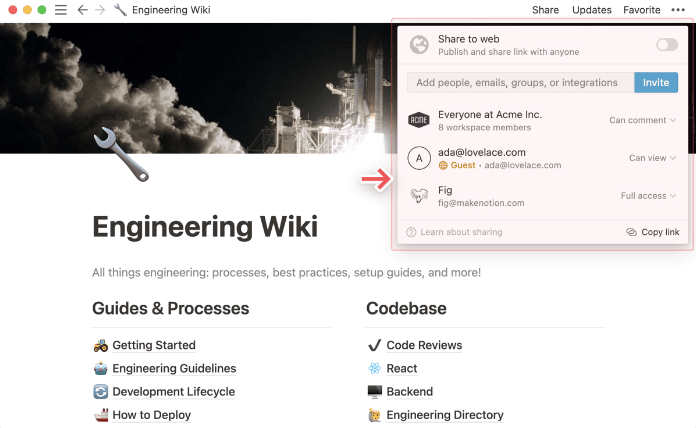
ميزة أذونات المشاركة في Notion
أوبسيديان
إذا كنت ترغب في التعاون في تحرير خزانة Obsidian، فسيتعين عليك بذل جهد إضافي. يمكنك استخدام مكون إضافي، ولكن لن يكون لديك نفس التجربة السلسة كما في Notion. لا يمكنك أيضًا إرسال رابط إلى شخص ما لعرض خزانتك في Obsidian. إذا كنت ترغب في مشاركة مخزن، فالخيار الوحيد هو تصديره بصيغة PDF أو نصية.
ومع ذلك، يمكنك مشاركة Obsidian مع العالم من خلال نشر Obsidian ومشاركة عنوان URL العام لخزينتك للعرض فقط.
4. حفظ الملاحظات تلقائيًا
حتى مع وجود الإنترنت في المنزل والنقاط الساخنة وشبكة الواي فاي الآمنة، لا يزال انقطاع التيار الكهربائي يحدث كل يوم - وجميعنا يعرف ذلك الشعور الرهيب عندما تدرك أن كل العمل الذي أنجزته للتو قد ضاع. 😳
هذا هو أحد الأسباب التي تجعل ميزات الحفظ التلقائي ووضع عدم الاتصال بالإنترنت من العوامل التي تغير قواعد اللعبة!
Notion
لحسن الحظ، لا داعي للقلق بشأن أي عطل في الإنترنت مع تطبيق Notion. يقوم التطبيق تلقائيًا بحفظ جميع ملاحظاتك في الوقت الفعلي، تمامًا كما هو الحال في مستندات جوجل أو إيفرنوت .
يتم حفظ ملاحظاتك على خوادم Notion قبل أن يتم نسخها احتياطيًا على السحابة. بالطبع، هذا ممكن فقط إذا كنت متصلاً بالإنترنت.
PSA: إذا كنت ترغب في استعادة النسخة القديمة من ملاحظاتك، فستحتاج إلى أن تكون مشتركًا متميزًا.
أوبسيديان
على غرار Notion، يحفظ Obsidian ملاحظاتك تلقائيًا بعد ثانيتين من انتهائك من الكتابة، لذا يمكنك الاطمئنان إلى أنك لن تفقد أي شيء بعد قضاء الوقت في إنشاء الرسم البياني المثالي. سيتم أيضًا حفظ ملاحظاتك تلقائيًا في كل مرة تغلق فيها جزءًا أو يدويًا باستخدام "Ctrl/Cmd-S".
5. دعم متعدد المنصات
تأتي القيمة الحقيقية لتطبيق تدوين الملاحظات من القدرة على مزامنة ملاحظاتك عبر الأجهزة. لا يوجد شيء أفضل من القدرة على تدوين الملاحظات على حاسوبك المحمول في الصباح ومتابعة ذلك على هاتفك المحمول أثناء استراحة الغداء. دعنا نرى ما إذا كان تطبيق Notion و Obsidian يجتازان هذا الاختبار.
Notion
أولاً، تحتاج إلى أن يكون لديك اتصال بالإنترنت لاستخدام Notion وسيتعين عليك التسجيل لاستخدام التطبيق. على الرغم من أن تطبيق Notion يحفظ ملاحظاتك على السحابة، فمن الأفضل أن تقوم بعمل نسخ احتياطية منتظمة لتجنب التعرض للحظر في حالة حدوث انقطاع في خوادمهم. يتيح لك Notion مزامنة ملاحظاتك عبر أنظمة ويندوز وماك وiOS وiOS وأندرويد وتطبيق الويب.
أوبسيديان
يعمل Obsidian دون اتصال بالإنترنت، حيث يتم تخزين ملاحظاتك محليًا على جهازك - وهذا أمر جيد وسيئ في نفس الوقت.
إنه أمر جيد لأنك ستظل تحتفظ بملفاتك النصية العادية، فقط في حالة تعرض Obsidian لأي تعطل، ولكنه سيء أيضًا لأنه لا يمكنك ببساطة مزامنة ملاحظاتك عبر الأجهزة دون الدفع مقابل الترقية.
الحل البديل لذلك هو أن تقوم أيضًا بحفظ ملاحظاتك على السحابة عند إنشاء خزانتك باستخدام Google Drive أو Dropbox أو Onedrive. إنها خطوة إضافية واحدة، ولكن الأمر يستحق العناء دائمًا لإجراء نسخ احتياطي لملاحظاتك.
6. التسعير
يقدم كل من Notion و Obsidian خطط مجانية للاستخدام الشخصي. ومع ذلك، تقدم Notion خطة احترافية للاستخدام الشخصي أيضًا. من ناحية أخرى، يتقاضى Obsidian رسومًا مميزة للاستخدام التجاري ورسومًا إضافية لوظائف النشر والمزامنة.
فيما يلي تحليل أسعار Obsidian مقابل Notion.
تسعير Notion
- شخصي (خطة مجانية): صفحات وكتل غير محدودة، ومزامنة عبر الأجهزة، ومشاركة مع 5 ضيوف، وواجهة برمجة التطبيقات للتكاملات المخصصة
- شخصية احترافية (4 دولارات شهريًا): كل ما في الشخصية المجانية بالإضافة إلى، تحميل غير محدود للملفات، عدد غير محدود من الضيوف، عرض واستعادة الإصدارات التي يعود تاريخها إلى 30 يومًا
- الفرق (8 دولارات شهريًا): كل ما في Personal Pro زائد، عدد غير محدود من أعضاء الفريق، وأذونات المشاركة، وأدوات التعاون، وأدوات الإدارة
- المؤسسات (تسعير مخصص): كل شيء في Teams plus، SAML SSO، توفير المستخدم (SCIM) سجل التدقيق (SCIM)، أمان وعناصر تحكم متقدمة، سجل إصدارات غير محدود، مدير نجاح مخصص (أكثر من 100 مقعد)، عقد مخصص
- نمو الذكاء الاصطناعي: أضف إلى أي خطة مدفوعة مقابل 8 دولارات لكل عضو/شهر
تسعير أوبسيديان
- شخصي (خطة مجانية): لا يلزم تسجيل حساب، ودعم المجتمع، والوصول إلى الإضافات وواجهة برمجة التطبيقات
- محفز (25 دولارًا تدفع لمرة واحدة): الوصول المبكر إلى الميزات الجديدة، وشارات المجتمع الخاصة، والوصول إلى قناة المطورين الحصرية
- تجاري (50 دولارًا لكل مستخدم سنويًا): الاستخدام التجاري وأولوية الدعم
- إضافات: المزامنة (8 دولارات شهريًا)، النشر (16 دولارًا شهريًا لكل موقع)
Notion مقابل Obsidian: هل لدينا بطل؟
ليس من السهل تتويج فائز واضح في حالة Notion مقابل Obsidian. فكلا التطبيقين Obsidian وNotion مفيدان في تدوين الملاحظات - ولكن لكل منهما قيود يصعب تجاهلها.
على سبيل المثال، تطبيق Obsidian غير متصل بالإنترنت فقط، لذا من الصعب مزامنة ملاحظاتك عبر الأجهزة. ستحتاج إلى دفع 8 دولارات إضافية شهرياً لتحقيق ذلك. من ناحية أخرى، فإن Notion متصل بالإنترنت فقط. إذا كنت بحاجة حقًا إلى تدوين شيء ما على Notion دون اتصال بالإنترنت، فلن يحالفك الحظ. كما أنه من الصعب قليلاً ربط ملاحظاتك بمساحات العمل على Notion، وهو أمر غير مريح تمامًا إذا كنت تفضل أتمتة سير العمل.
لحسن الحظ، نحن نعرف برنامج MVP المثالي لمساعدتك في أخذ استراتيجيات تدوين الملاحظات إلى المستوى التالي.
Obsidian مقابل Notion على موقع Reddit
أخذنا إلى ريديت لمعرفة أين يهبط الناس على Obsidian مقابل Notion. عند البحث نوتيون مقابل أوبسيديان على موقع ريديت يتفق العديد من المستخدمين على أن Notion لديه مجموعة أكثر فائدة من الميزات المتقدمة:
"السمة الرئيسية المميزة لـ Notion هي استخدامه لقواعد البيانات وكيف يمكنك تصفية الملاحظات في مجموعة متنوعة من طرق العرض ومجموعة متنوعة من العلامات والحصول على بعض الأشياء الخاصة الحقيقية."
لاحظ مستخدمو ريديت الآخرون أن Obsidian هو الخيار الأفضل إذا كنت تبحث عن ميزات الربط الخلفي:
"Obsidian من ناحية أخرى هو غير متصل بالإنترنت فقط وميزته الرئيسية هي الروابط والروابط الخلفية من خلال الملاحظات وتصور تلك الروابط، فإذا كان لديك مجموعة من الملاحظات التي تذكر فيها كلمة كيمياء سيتم ربطها جميعًا في الرسم البياني نفسه، وينتهي الأمر بشبكة من المعرفة."
## أفضل بديل لـ Obsidian مقابل Notion: كليك أب
أنشئ مستندًا جديدًا من أي مكان في مساحة عمل ClickUp وأضف صفحات فرعية وجداول وخيارات تصميم لإنشاء الهيكل المثالي
نعم، يبدو كل من Obsidian و Notion رائعين نوعًا ما، ولكن هل جربت من قبل انقر فوق ?
تخيّل أنك لن تنسى أبداً موعداً نهائياً أو بنداً من بنود البقالة أو موعداً بعد الآن. والأكثر من ذلك، تخيل برنامجًا لتدوين الملاحظات ترغب في استخدامه بالفعل، وتتطلع إلى فتحه كل يوم! حسنًا، هذا هو ClickUp.
ClickUp هو منصة الإنتاجية المثالية الشاملة لإدارة المشاريع، وتدوين الملاحظات التفصيلية، وتتبع تقدمك، كل ذلك من شاشة واحدة. سواءً كنت طالبًا أو صاحب شركة صغيرة أو جزءًا من فريق عمل كبير الحجم، فإن ClickUp مصمم ليأخذ تدوين ملاحظاتك خطوة إلى الأمام.
مع ديناميكية مستندات ClickUp ، يمكنك إنشاء مواقع ويكي وقواعد معرفية وقوائم تدقيق وملاحظات جميلة - مخصصة حسب رغبتك مع خيارات التصميم والتنسيق البديهية بما في ذلك اللافتات والجداول وتحرير النص المنسق والمزيد.
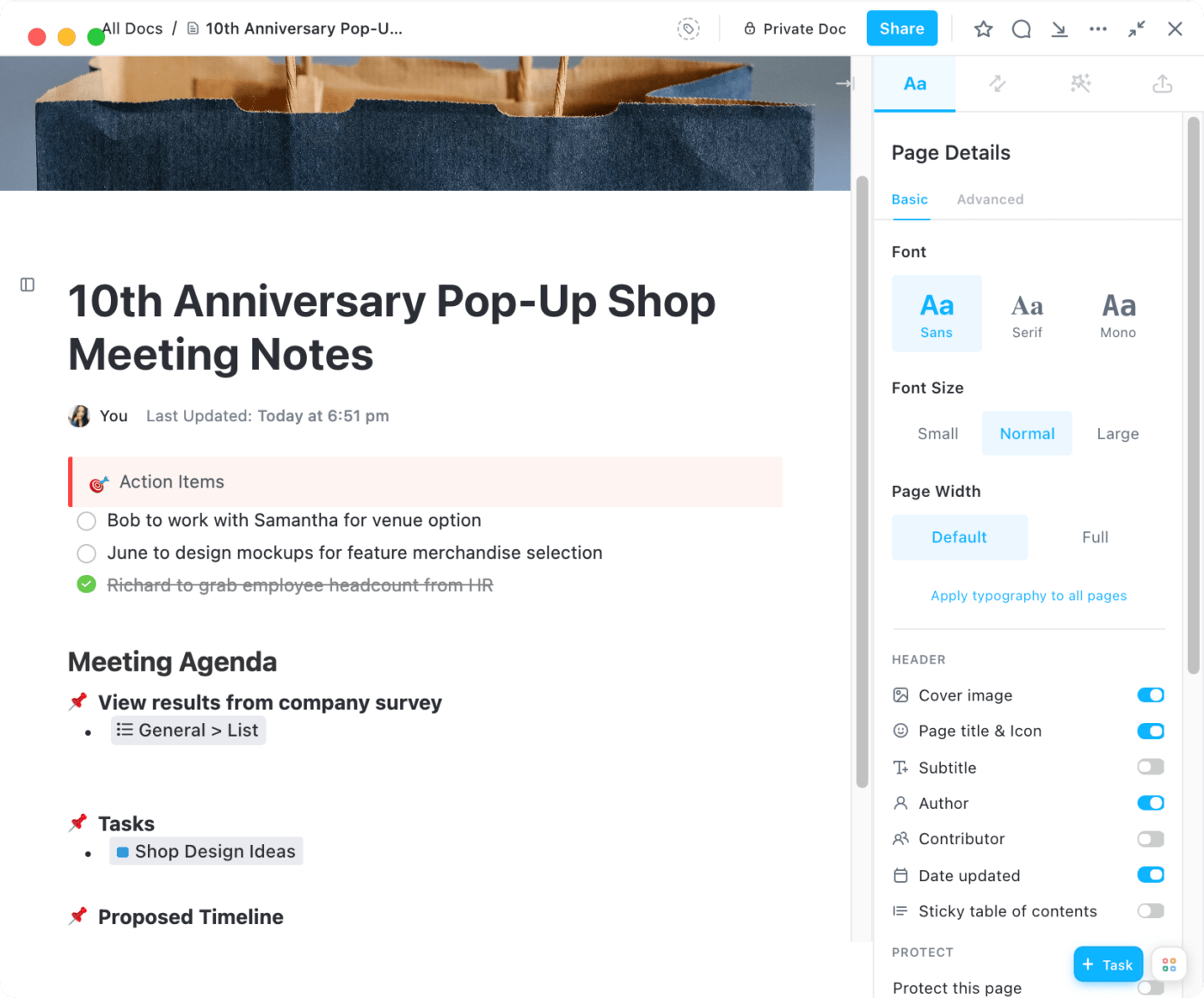
استخدم أوامر الشرح المائل وتحرير النص المنسق لتنظيم ملاحظاتك بسرعة في ClickUp Docs
أنشئ تسلسلاً هرميًا مرئيًا باستخدام صفحات متداخلة، وأضف روابط خلفية لإنشاء شبكة مترابطة من الأفكار، وحتى تحويل النص إلى مهمة قابلة للتنفيذ. يمكنك دائمًا توقع إنجاز المزيد في مستند ClickUp Doc.
تعاون في الملاحظات
يتيح لك ClickUp Docs تحرير مستند إلى جانب فريقك. يمكنك تعيين أعضاء الفريق عناصر العمل أو الإشارة إليها بتعليق على نص المستندات. يمكنك أيضًا تحويل النص في المستندات إلى مهام وتفويض هذا القسم إلى أعضاء الفريق.
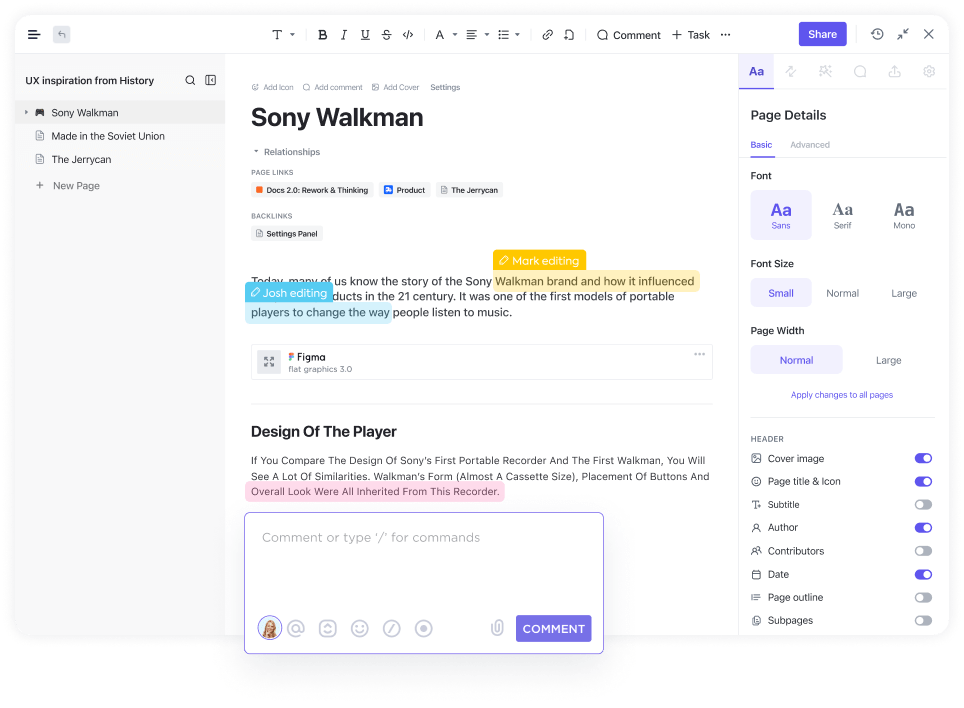
قم بالتحرير جنبًا إلى جنب مع الفريق، وإبداء التعليقات، وتفويض المهام للأعضاء الآخرين مباشرةً من مستند ClickUp الخاص بك
يمكنك مشاركة مستندك بسهولة عبر عنوان URL، والتحكم بسهولة في من يمكنه التعديل من خلال إدارة الأذونات للفريق أو الضيوف أو الوصول العام.
قم بإنشاء مركز معرفة أو ويكي شخصي
بغض النظر عن مدى نظافة أو تعقيد مستندك، فإن ClickUp Docs تجعله كذلك.
ينشئ ClickUp تلقائيًا رابطًا خلفيًا في كل مرة تذكر فيها محتوى ذا صلة. يمكنك بعد ذلك عرض جميع العلاقات والمحتوى ذي الصلة بالصفحة الحالية من قسم العلاقات والروابط الخلفية على الشريط الجانبي.
عند الانتهاء من إنشاء ملاحظاتك، سيكون لديك هيكل منظم ومترابط من الأفكار حيث ترتبط جميع ملاحظاتك بموضوعات محددة.
تبسيط سير عمل إدارة المشاريع الخاصة بك مع ClickUp Docs
أفضل جزء في ClickUp Docs؟ إنه بديهي. حتى مع وجود قائمة متزايدة باستمرار من مستندات الميزات الوظيفية والتعاونية ، تم تصميم ClickUp لمساعدتك على البقاء على رأس كل مهمة وتوسيع نطاقها مع نموك - حتى من داخل المستند.
اربط مستنداتك بالمهام لتسهيل التفويض وإدارة المهام أو أضف عناصر واجهة مستخدم لتحديث سير عملك، كل ذلك من داخل محرر المستند.
ارفع من مستوى كتابتك باستخدام ClickUp AI ClickUp AI هو منشئ محتوى ومساعد يساعدك على إنجاز عملك بشكل أسرع. سيساعد ClickUp AI المستخدمين على التغلب على عائق الكتابة، وتحسين العصف الذهني، وتبسيط عملية إنشاء المحتوى الخاص بك.
المزيد لتحبها في ClickUp Docs
- تفاصيل الصفحة المخصصة: تتبّع عدد كلمات مستندك ووقت القراءة في إنشاء ملاحظاتك. حتى يمكنك تخصيص تفاصيل الصفحة لتضمين أو استبعاد خصائص مثل اسم المؤلف وتاريخ الإنشاء وجدول المحتويات اللاصق وصورة الغلاف والمزيد.
- وضع التركيز: اختر التخلص من المشتتات للحصول على تجربة كتابة أكثر بساطة.
- قوالب المستند: اختر من مكتبة ClickUp الواسعة منقوالب معدة مسبقًا أوإنشاء مخصص خاص بك من البداية.
- وضع عدم الاتصال بالإنترنت: قم بتدوين الملاحظات أينما ومتى في وضع عدم الاتصال بالإنترنت، وقم بالوصول إلى جميع التغييرات التي أجريتها مرة أخرى في ClickUp تلقائيًا بمجرد استعادة الاتصال بالإنترنت.
- ملحق الكروم : الوصول إلىانقر فوق المفكرة من أي متصفح ويب وحتى تحويلها إلى مهمة في مساحة العمل الخاصة بك من علامة تبويب أخرى.
- أرشفة المستندات: تخلص من الفوضى في مستنداتك عن طريق أرشفة المستندات التي نادرًا ما تستخدمها، ثم اعثر عليها مرة أخرى في ثوانٍ باستخدام العلامات.
وهل ذكرنا أنك ستحصل على كل هذه الميزات مجانًا إلى الأبد 💸
تسعير ClickUp
- مجاني إلى الأبد: جميع أدوات ClickUp القوية لتدوين الملاحظات، ومُستندات ClickUp، ومهام وأعضاء غير محدودة، و100 ميغابايت من السعة التخزينية، والمزيد
- غير محدود (7 دولارات لكل عضو، شهريًا): مساحة تخزين غير محدودة، وتكامل غير محدود، ولوحات تحكم غير محدودة
- الأعمال (12 دولارًا لكل عضو، شهريًا): فرق غير محدودة، وتصدير مخصص، ومشاركة عامة متقدمة
- المؤسسات (اتصل بالمبيعات لمعرفة الأسعار): واجهة برمجة تطبيقات للمؤسسات، وإعداد موجه، ومدير نجاح مخصص
- ClickUp AI متاح على جميع الخطط المدفوعة مقابل 5 دولارات لكل عضو في مساحة العمل شهريًا
مقالات ذات صلة:_
- إيفرنوت مقابل ون نوت
- ون نوت مقابل ون نوت
- إيفرنوت مقابل بير
- إيفرنوت مقابل مستندات جوجل
- نوتيون مقابل كودا
- نوتيون مقابل تودويست
ClickUp: الحل لمناظرة Notion مقابل Obsidian Debate
مع ClickUp، لن تحصل مع ClickUp على تطبيق مفيد لتدوين الملاحظات فحسب، بل ستحصل على مركز موثوق ومركزي لجميع أعمالك. اشترك في باقة ClickUp المجانية للأبد للاستمتاع بجميع ميزات تدوين الملاحظات القوية.

